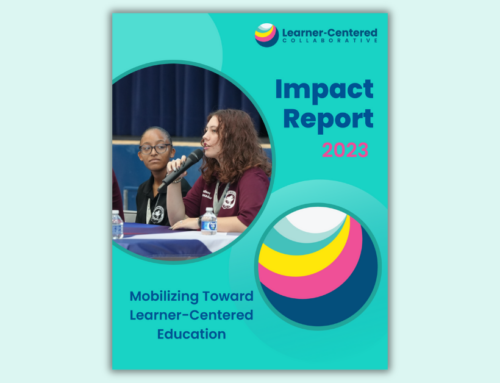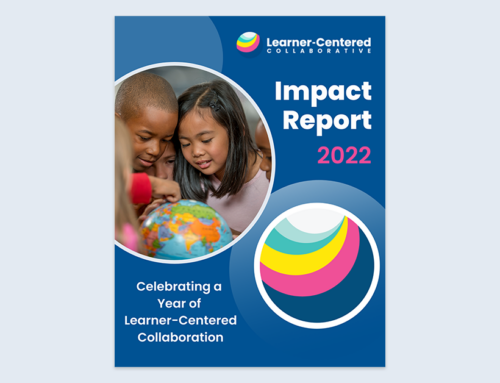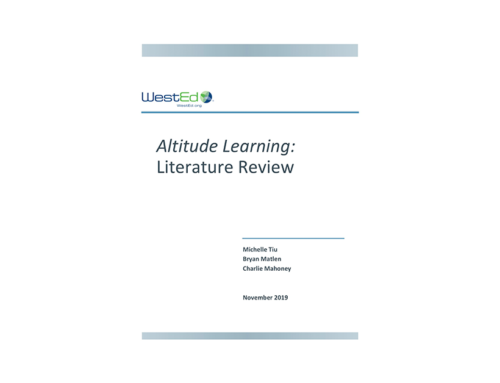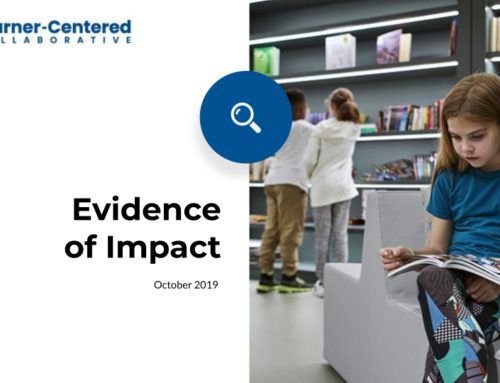We are pleased to share a summary of our research-informed approach to the development and refinement of the Altitude Learning platform. Our efforts began during our time as AltSchool. As AltSchool, we ran a network of K-8 microschools in San Francisco and New York. Within these schools, we were able to co-develop a technology platform in tandem with students, families, and educators, iterating based on a combination of learning science research and classroom experiences across our microschools. Over the past three years, we have rebranded as Altitude Learning and continue to share the same technology platform through a partnership network of K-12 schools across the United States.
To align our technology platform with the realities of how students learn best, we have relied extensively on the learning sciences. We had a team – initially called the Central Pedagogy Group and then renamed the Central Learning Group – that shared research and created learning agendas to guide the work of our product, engineering, and design teams. We then formed a Learning Council that included members of the Central Learning Group, designers, engineers, and teachers to inform roadmap plans and make product decisions. Below are examples of peer-reviewed studies that informed the development and design of our product:
- Zepeda, C. D., Richey, J. E., Ronevich, P., & Nokes-Malach, T. J. (2015). Direct instruction of metacognition benefits adolescent science learning, transfer, and motivation: An in vivo study. Journal of Educational Psychology, 107(4), 954–970.
- Durlak, J. A., Weissberg, R. P., Dymnicki, A. B., Taylor, R. D. & Schellinger, K. B. (2011). The impact of enhancing students’ social and emotional learning: A meta-analysis of school-based universal interventions. Child Development, 82(1), 405–432.
- Holsen, I., Smith, B. H., & Frey, K. S. (2008). Outcomes of the Social Competence Program Second Step in Norwegian Elementary Schools. School Psychology International, 29(1), 71–88.
Together, these studies indicate that in the context of K-12 education, direct instruction focusing on metacognition/self-reflection and social-emotional skills can positively impact students’ motivation, behavior, self-perception, and problem-solving abilities. In other words, an instructional approach that emphasizes mindsets, habits, and skills – not just academic knowledge – has the potential to enrich K-12 learning and drive student success.
Our lab schools and technology platform were designed with these key SEL studies in mind. Now, through our technology platform, we continue to scaffold instructional practices that support the growth of the whole child by encouraging metacognition, planning, reflection, and social-emotional skill development in addition to progress toward academic competencies. Informed by learning science research on the importance of metacognition and SEL to student achievement, the features of the Altitude Learning platform serve to help educators build students’ motivation and agency, social skills, and problem-solving abilities. As a company, our goal is to support whole-child, learner-centered practices in hopes of ultimately enabling all learners to co-design their own learning journeys and achieve their full potential.
Please see the bibliography below for a more detailed sampling of the resources we have consulted in the process of developing technology tools that support a whole-child, learner-centered approach.
An Excerpt from our Bibliography:
Allensworth, E.M., Farrington, C.A., Gordon, M.F., Johnson, D.W., Klein, K., McDaniel, B., & Nagaoka, J. (2018). Supporting social, emotional, & academic development: Research implications for educators. Chicago, IL: University of Chicago Consortium on School Research.
Durlak, J. A., Weissberg, R. P., Dymnicki, A. B., Taylor, R. D. & Schellinger, K. B. (2011). The impact of enhancing students’ social and emotional learning: A meta-analysis of school-based universal interventions. Child Development, 82(1), 405–432.
Farrington, C.A., Roderick, M., Allensworth, E., Nagaoka, J., Keyes, T.S., Johnson, D.W., & Beechum, N.O. (2012). Teaching adolescents to become learners. The role of noncognitive factors in shaping school performance: A critical literature review. Chicago: University of Chicago Consortium on Chicago School Research.
Holsen, I., Smith, B. H., & Frey, K. S. (2008). Outcomes of the Social Competence Program Second Step in Norwegian Elementary Schools. School Psychology International, 29(1), 71–88.
Jackson, C. (2018). What Do Test Scores Miss? The Importance of Teacher Effects on Non-Test Score Outcomes. Journal of Political Economy, 126(5), 2072-2107.
Jennings, P. A., Frank, J. L., Snowberg, K. E., Coccia, M. A., & Greenberg, M. T. (2013). Improving classroom learning environments by Cultivating Awareness and Resilience in Education (CARE): Results of a randomized controlled trial. School Psychology Quarterly, 28(4), 374–390.
Marks, H. M. (2000). Student engagement in instructional activity: Patterns in the elementary, middle, and high school years. American Educational Research Journal, 37(1), 153–184.
Merritt, E. G., Wanless, S. B., Rimm-Kaufman, S. E., Cameron, C., & Peugh, J. L. (2012). The contribution of teachers’ emotional support to children’s social behaviors and self-regulatory skills in first grade. School Psychology Review, 41(2), 141-159.
Nasir, N.I.S., McLaughlin, M.W., & Jones, A. (2009) What does it mean to be African American? Constructions of race and academic identity in an urban public high school. American Educational Research Journal, 46(1), 73-114.
Oreopoulos, Philip, Brown, Robert S., & Lavecchia, Adam M. (2017). Pathways to Education: An Integrated Approach to Helping At-Risk High School Students. Journal of Political Economy, 125(4), 947-984.
Pintrich, P. R. (2000). Multiple goals, multiple pathways: The role of goal orientation in learning and achievement. Journal of Educational Psychology, 92(3), 544–555.
Smiley, P., & Dweck, C. (1994). Individual Differences in Achievement Goals among Young Children. Child Development, 65(6), 1723-1743.
Zepeda, C. D., Richey, J. E., Ronevich, P., & Nokes-Malach, T. J. (2015). Direct instruction of metacognition benefits adolescent science learning, transfer, and motivation: An in vivo study. Journal of Educational Psychology, 107(4), 954–970.




